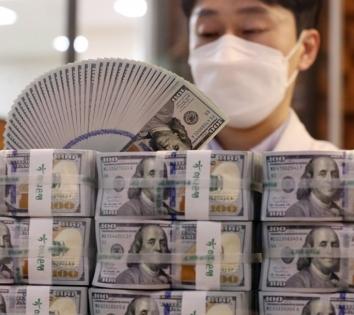US tariffs to cut S. Korea's economic growth by 0.45 pp in 2025
By IANS | Updated: September 11, 2025 10:10 IST2025-09-11T10:09:45+5:302025-09-11T10:10:15+5:30
Seoul, Sep 11 The United States' trade policy is estimated to lower South Korea's economic growth rate by ...

US tariffs to cut S. Korea's economic growth by 0.45 pp in 2025
Seoul, Sep 11 The United States' trade policy is estimated to lower South Korea's economic growth rate by 0.45 percentage point this year, the central bank here said on Thursday.
After months-long negotiations, Seoul and Washington reached a crucial agreement in late July, under which the US imposes a 15 percent tariff on South Korea, down from the initially planned 25 percent, in exchange for an investment pledge of $350 billion in the US, reports Yonhap news agency.
"The impact of the U.S.' tariff policies was limited in the first half on the back of U.S. companies' inventory accumulation, pre-exports to the U.S. by other countries and shared burdens by businesses. But the effects are expected to become more visible going forward," the Bank of Korea (BOK) said its latest biannual monetary policy report.
Compared with a scenario without tariff increases, the Donald Trump administration's new policy is estimated to reduce South Korea's growth rate by 0.45 percentage point in 2025 and 0.6 percentage point in 2026, due mainly to weakened trade, financial challenges and increased uncertainties, it added.
In detail, the impact of the aggressive tariff policy will be transmitted to the Korean economy through three channels: trade, finance and uncertainty. Each is expected to reduce this year's economic growth by 0.23 percentage point, 0.09 percentage point and 0.13 percentage point, respectively, according to the report.
Rising export costs and reduced overall demand due to higher prices in the U.S. are expected to lead to a decline in exports to the U.S. Among major industries, the steel, vehicles and machinery sectors are expected to be particularly hit hard.
"From a financial perspective, U.S. tariffs could increase inflationary pressures, leading to tighter monetary policy in the U.S. This may delay improvements in both domestic and international financial conditions, negatively affecting the real economy," the report said.
"Uncertainties stemming from the tariff policy would reduce investment and consumption," it added.
Disclaimer: This post has been auto-published from an agency feed without any modifications to the text and has not been reviewed by an editor
Open in app